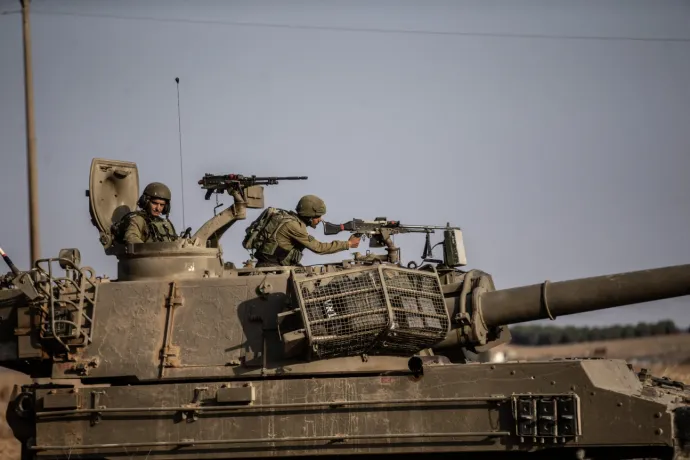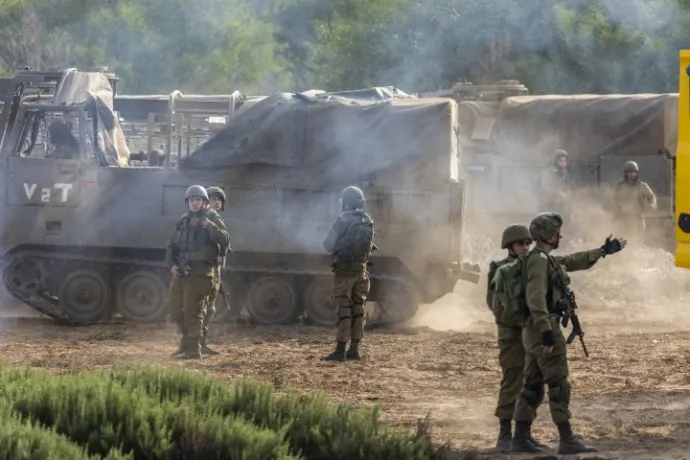"One hostage would be reason enough for me to go, but I have 150-200 reasons"- an Israeli-Hungarian citizen voluntarily returns to fight
October 14. 2023. – 09:24 AM
updated

"I was upset with my family for writing in the family group chat on a Saturday morning, the day of rest. Then I saw that my mother wrote that something very serious has happened. And if my mother says that, then you know it's really bad," the Israeli-Hungarian dual citizen living in Hungary, going by the pseudonym B. Mendel, told Telex about last Saturday morning. Although he would not be obligated to join the army, he will likely be near the front by this weekend. Israel could be preparing for one of the biggest operations in its history: with 360,000 mobilised reservists, of which 100,000 troops are on the Gaza border. The army simply told Mendel: "Just come".
B. Mendel is the child of Hungarian and Israeli parents. He spent half his life in Israel, but has been living in Hungary on and off since 2010. He wouldn't have to go now – the army can't call him up while he's living abroad – but on Saturday morning he decided to return home to fight as soon as possible.
His story began in 2014, during Operation Strong Cliff, launched by the Israel Defense Forces in the Hamas-controlled Gaza Strip to eliminate rocket attacks being launched from the area. Two of Mendel's friends were killed in action during the operation.
"At that moment I looked around and saw that I was in a peaceful European country, in a completely different reality, in another world. I was so disturbed by this dissonance that I decided to enlist."
– he said. This was one of the main motivating factors for him to go to a country at war as a young man, and to do so entirely of his own free will. "I felt I owed it to everyone in my class, to my country, to my village," he said.
When he enlisted in 2014, he was assigned to an elite unit, which Mendel says can be compared to the regular military, as if one were accepted into a prestigious university. He felt more useful as an ordinary soldier though, so he also served as such for a while. The only thing that's hard for them as soldiers is that they remain "anonymous heroes" for the rest of their lives. In the military, they are also taught how to properly deal with this. He was released after serving three years, but they called him back – so for a while, he worked as a regular soldier – but returned to Hungary last summer.
Last Saturday, after hearing about what happened in the family chat, he checked the news and saw how Hamas was dragging civilians away. "They were taking them beyond the fence on the border. That's not like the fence of an institution, this fence leads to hell, you have very little chance of returning from there," said B. Mendel. It really distressed him when he saw that Hamas was not taking fighting-age men and soldiers, but small children, young girls and mothers.
He said that he had no problem with soldiers being killed and taken hostage because, as he put it, "that's what a soldier does: fight, be taken hostage, die". He said that they are trained for that their whole life, but kidnapping and torturing a child or a mother is cruel. B. Mendel is convinced that Hamas had help, because in his opinion there is no way they could have carried out this operation on their own.
“There's no time to send you a draft notice, just come!”
B. Mendel called his former commander that morning and told him he wanted to go. His commander was one of those who told him that he did not have to go. Then he contacted another officer to ask for a summons, who only said, "Don't you understand what happened? We are at war! Just come, no one will send you a draft notice now". He then bought his ticket for last Sunday but Wizz Air and Ryanair both cancelled their flights. He finally managed to get a ticket for this weekend, for the flight of the Israeli airline, which is the only one flying into the country from Budapest.
“They tried to talk me out of it. A lot of people don't understand what I want with this. They say I've got everything I need, why go looking for trouble?”
It was particularly difficult to explain to his parents and family why he was going to fight. "I always tell them to watch the video of the children being taken hostage. One hostage would be reason enough for me to go, but there are many more, 150 or 200 reasons to go," he said. Another of his reasons for going happened on Wednesday: he was speaking with his mother on video chat when their village in northern Israel was hit. "All of a sudden, the line went dead. I checked the news, and saw that 15 drones had entered our territory from Lebanon. Do you know how shitty it feels to have your mother be shot at? It's bad enough if someone insults your mother, let alone shoots at her," he said.
They have never been in this situation before: 360,000 reservists have been called up
Commenting on the current fighting, B. Mendel said that they had not been in such a situation since 1948, the year the State of Israel was established. "It is also unprecedented that so many people are mobilized. "The Yom Kippur war was similar, but it was on a much smaller scale, and the technology we have today wasn't available then," he said. The scale of the mobilisation is well illustrated by the fact that he is in contact with several Israeli soldiers who have asked him to get them equipment here in Hungary. "It's not weapons we need, but vests, jackets, knee pads and other accessories," he said.
Israel has indeed embarked on one of the most extensive mobilisations in its history since the conflict erupted last Saturday. More than 300,000 reservists have been called up to the army, which already has 150,000 soldiers. Israeli Defence Minister Yoav Gallant said that this was necessary because Israel is 'battling beastly people' and they must behave accordingly. The reserve forces, which come from different parts of Israeli society, number some 450,000 men. Many of them already have combat experience, unlike the younger soldiers serving in the army.

"The state doesn't know what to do, it's stuck. Should we invade Gaza? Then the hostages will die. Do we try to free them? That would mean many casualties. And we shouldn't negotiate with them because they are terrorists," B. Mendel told Telex. According to him, another reason why the current situation is unprecedented is because Hamas has managed to conquer peaceful kibbutzim. He said that during the attacks many people fled to safe rooms which the terrorists could not enter from outside, so they simply set fire to these people's houses.
B. Mendel considers it important that Israel is forming a unity government, which he says is also important because the country has a right-wing government, but many good commanders and generals are left-wing. "On the front lines, there are no right-wingers, left-wingers, religious, atheists, there are only soldiers." He added that it's sad that it takes a war to become unified like that, "but that's the reality now, that's the way it is".
They are preparing for months of fighting
B. Mendel is expecting the Israeli army to respond with more than air strikes soon. Initially he would have guessed that the fighting would last a year or two, but now he predicts the conflict could be over in 2-3 months.
The reason why the Israeli army needs so much conventional artillery and plain infantry now is presumably so that it can launch a major offensive in the Gaza Strip. In addition to the more than 360,000 troops mobilised, Israel has evacuated tens of thousands of residents from settlements near the Gaza Strip, AP reports, indicating the seriousness of the expected offensive.
The Israeli government has not yet said if or when it would launch an offensive against the Gaza Strip, but experts are also anticipating a drawn-out ground operation. The Israeli security cabinet's announcement on 8 October said that the goal of the Israeli military operation was "to dismantle Hamas' military and governing capabilities". For Israel to really strike a decisive blow against Hamas, air strikes will not be enough: "If you look at the targets, you can see that they can only be reached by land," Israeli expert Yaakov Lappin told Time.
B. Mendel, who spoke with Telex, is not officially a reservist, but those who are, are also enlisting with similar dedication. Michael Goldberg, a 24-year-old reservist from Jerusalem, came home from the United States to visit family, and although he is packing his bags, it's not to return to the US, but to join the army. "In Israel, you start preparing for this before you even get the call-up," he told the BBC. B. Mendel and Goldberg are not the only ones:
so many reservists have felt the need to return home that Israel's El Al airline has announced extra flights.
In recent days, at least 100 reservists from the UK have indicated their intention to fight. B. Mendel said that when he arrives in Israel, he won't have time to go home. "I won't even have time to go home and kiss my mother because as soon as I land, I'm going to the front." He says he had seen a few "minor hairy situations" during his service before, but this will be his first time on the front line.
For more quick, accurate and impartial news from and about Hungary, subscribe to the Telex English newsletter!